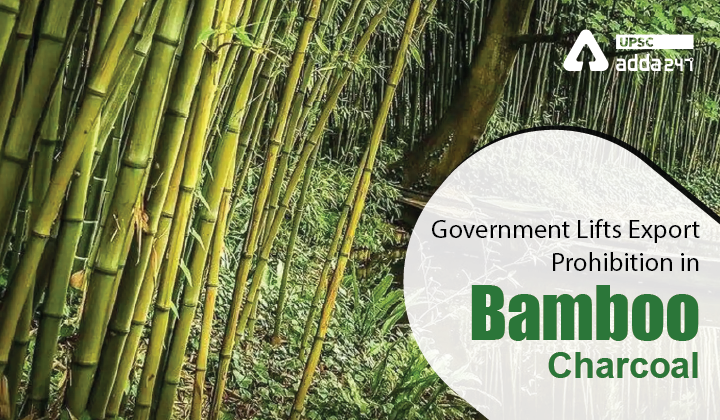Table of Contents
Bamboo Industry in India UPSC: Relevance
- GS 3: Indian Economy and issues relating to planning, mobilization, of resources, growth, development and employment.
Bamboo industry in India: Context
- Recently, Ministry of Micro, Small & Medium Enterprises has informed that the government has lifted the “export prohibition” of bamboo charcoal to facilitate optimum utilization of raw bamboo and higher profitability in the Indian bamboo industry.
What is bamboo charcoal?
- All the bamboo charcoal made from bamboo obtained from legal sources are permitted for export subject to proper documentation/certificate of origin proving that the bamboo used for making charcoal has been obtained from legal sources.
- Bamboo charcoal has a huge demand in the international market and lifting of export prohibition by the government will enable the Indian bamboo industry to tap this opportunity and exploit the huge global demand.
- This will also ensure optimum utilisation of bamboo waste and thus contribute to the Prime Minister’s vision of Waste to Wealth
Issues in bamboo industry
- Indian bamboo industry, at present, is grappling with extremely high input cost owing to inadequate utilization of bamboo.
- In India, bamboo is mostly used in manufacturing of Agarbatti wherein, a maximum of 16% is used for manufacturing of bamboo sticks while the remaining 84% of bamboo is a complete waste.
- As a result, the Bamboo input cost for Round Bamboo Sticks is in the range of Rs 25,000 to Rs 40,000 per MT as against the average Bamboo cost of Rs 4,000 to Rs 5,000 per MT.
Benefits of bamboo
- Ecological benefits
- It conserves water and hence can show a path for the future in the water-stressed districts of our country.
- It could perform the function of carbon sequestration (Green House Gases) from the atmosphere and thus reduce global warming.
- Economic benefits
- It contributes significantly to sustainable development and ensuring food security.
- It can be used as a food, a wood substitute, building and construction material, making handicrafts and paper or, even can be used in making
- It creates self-employment for the farmers, hence leading to an increase in farmer’s income.
- It is part of the rural economy of many developing countries, including India. Due to its multipronged uses, it is often referred to as poor man’s timber.
- Social Benefits
- It ensures equity among the rural people as it benefits a large section of women and unemployed people.
- Bamboo, historically, is mostly grown in tribal areas. Using bamboo can help the tribals connect with the mainstream population and hence be a part of inclusive development.
Steps taken by the government to support bamboo cultivation
- National Bamboo Mission was launched in 2007. It emphasised mainly on propagation and cultivation of bamboo. The project, however, had limited success as it did not focus enough on bamboo’s processing, product development and value-addition. Taking into consideration these limitations, a restructured National Bamboo Mission was launched in 2018.
- In 2017, the government passed the Indian Forest (Amendment) Act and relaxed the restrictions on harvesting, transit and trade of bamboo, in non-forest areas.
- The government allocated $200 million in the budget 2018 to support bamboo cultivation, especially in North-Eastern states.
- Subsequently, in September 2019, the Ministry of Commerce “restricted” the import of raw Agarbatti and in June 2020, the Ministry of Finance increased the import duty on round bamboo sticks.
Read current affairs for UPSC
| Intersolar Europe 2022 | National Data and Analytics Platform | Global Food Policy Report 2022 | Eklavya Model Residential Schools |
| ‘BHARAT TAP’ Initiative | 2nd Global COVID Virtual Summit 2022 | State of the World’s Birds Report 2022 | Public Private Partnership (PPP) Guidelines to Resolve Stuck Projects at Major Ports |
| Mission Amrit Sarovar | United Nations Convention to Combat Desertification (UNCCD)- COP15 of UNCCD | Insolvency and Bankruptcy Code: Shrinking Recoveries a Cause of Concern | National Physical Literacy Mission: Making Sports a Fundamental Right |
| PM Reviews Implementation of National Education Policy | Pantanal Wetland is at Risk of Collapse, Scientists Warn | Crisis in Sri Lanka- Sri Lankan PM Resigns | Data Empowerment and Protection Architecture |
| Global Report on Food Crisis 2022 | Global Declaration on Future on Internet | National Film Heritage Mission | North East Festival 2022 |



 TSPSC Group 1 Question Paper 2024, Downl...
TSPSC Group 1 Question Paper 2024, Downl...
 TSPSC Group 1 Answer key 2024 Out, Downl...
TSPSC Group 1 Answer key 2024 Out, Downl...
 UPSC Prelims 2024 Question Paper, Downlo...
UPSC Prelims 2024 Question Paper, Downlo...





